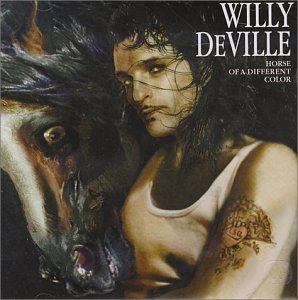

from silver Horse Of A Different Color 1999 German Warner EastWest 3981-26690-2
Willy DeVille is the artist who seemingly steps forward while always looking back. While his career has been layered upon his phenomenal interpretive abilities as a singer (one of the few people Doc Pomus trusted to interpret his songs at the end of his life) and he has looked to material from mazurkas to sweaty R&B tunes, DeVille's often been falsely accused by American critics of posing. Horse of a Different Color follows in the footsteps of two records of New Orleans R&B-oriented material, but hearkens back to 1993's Backstreets of Desire to showcase DeVille at what he does best: music hall, ballads, and blues songs with a killer backing band, courtesy of producers Jim and Luther Dickinson (with appearances by Sid Selvidge, Spooner Oldham, Jimmy Johnson, and others). Who would have thought anyone could sing "The Borderline" better than Harry Dean Stanton did in Paris, Texas? But here it is, delivered with all the resignation, hope, and pathos the song was written to enfold. On "Gypsy Deck of Hearts," DeVille's Spanish soul-inflected love songs, drama, and tragedy entwine with empathy and optimism to create a fairy tale. On "Lay Me Down Easy," another mid-tempo soul burner, DeVille's broken lover offers his heart to be betrayed, but gently, to a cruel yet beautiful other. Yet immediately following is a ferociously greasy cover of Mississippi Fred McDowell's "Goin' Over the Hill," followed by a combination doo wop/'50s teen pop rocker called "One Love, One Lifetime," followed by a searing rendition of "Needles and Pins." Before it's over, DeVille has reprised his soulman balladeer role -- and no one sings them better -- as well as cruising through a topical folk song, a chain-gang chant with a devastating rhythm track, and an R&B growler by Andre Williams before closing with his own "Time to Time," a broken-survivor song about love's ceaseless wars. Simply put, no one has this range or depth in interpreting not only styles, but also the poetics of virtually any set of lyrics. DeVille makes everything he sings believable. Horse of a Different Color is the most consistent and brilliant recording of Willy DeVille's long career.